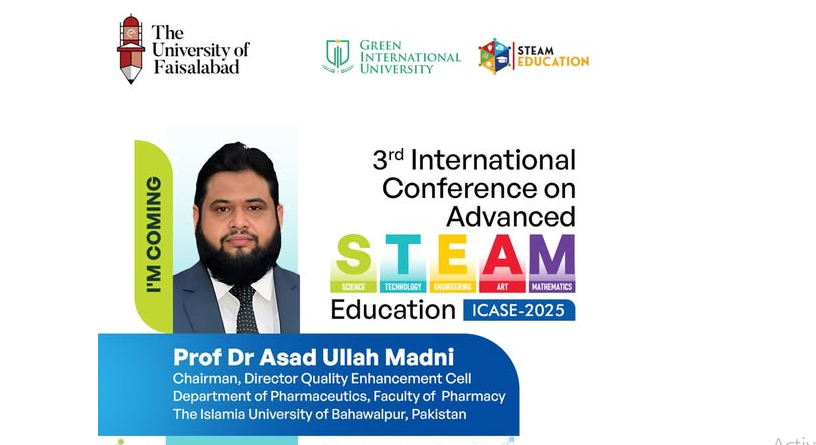Nano-Enabled Drug Delivery Systems for Cardiovascular Therapeutics
Nanotechnology has revolutionized pharmaceutical sciences, offering innovative solutions for drug delivery, targeted therapeutics, and improved patient outcomes. One area of growing interest is nano-enabled drug delivery systems for cardiovascular therapeutics, which promise enhanced bioavailability, controlled release, and reduced systemic side effects. This topic was the focus of a dedicated session at the STEAM Conference 2025, held in Ali Auditorium, Venue 1, under the Pharmacy 1 track.
The session was chaired by Dr. Asad Ullah Madni (Islamia University, Bahawalpur), who highlighted the critical role of nanoformulations in addressing cardiovascular diseases—one of the leading causes of morbidity worldwide. Supporting him as Co-Chair, Dr. Sadia Rafique (The University of Faisalabad) emphasized the importance of integrating research, industry readiness, and education to advance pharmaceutical innovation in Pakistan.
Keynote Insight: Innovations in Transdermal Drug Delivery – Tanveer A Tabish (Islamia University, Bahawalpur)
The session began with a talk by Tanveer A Tabish, focusing on novel transdermal drug delivery techniques. He highlighted how nanocarrier systems can improve penetration, enhance therapeutic efficacy, and minimize side effects. His presentation showcased the potential of nano-enabled systems to transform conventional cardiovascular therapies.
Invited Talks Highlighting Pharmaceutical Innovations
Integrating Bioequivalence Studies into Pharmacy Education – Muhammad Sohail Arshad (BZU, Multan)
Muhammad Sohail Arshad discussed the role of bioequivalence studies in pharmacy education, demonstrating how they build competence and industry readiness for therapeutic excellence. He emphasized that hands-on experience with nanopharmaceutical formulations enhances students’ understanding of drug delivery, efficacy, and regulatory compliance.
Role of Pharmacist in the One Health Approach – Muhammad Asadullah Madni
Muhammad Asadullah Madni highlighted the pharmacist’s role in the One Health framework, bridging human, animal, and environmental health. His talk emphasized how nano-enabled drug systems can contribute to integrated healthcare strategies while minimizing environmental impact.
Carvone‑Loaded Chitosan Nanoparticles for Joint Protection – Zunaira Afzal & Bushra Akhtar (University of Agriculture, Faisalabad)
Zunaira Afzal and Bushra Akhtar presented research on carvone-loaded chitosan nanoparticles, demonstrating their ability to alleviate joint destruction by downregulating pro-inflammatory cytokines and MMP‑13 in adjuvant-induced rat models. Their study highlighted the potential of nanoformulations for targeted anti-inflammatory therapies in cardiovascular and musculoskeletal conditions.
Chitosan Nanoparticle Cream with Lemon Extract – Sadia Rafique (The University of Faisalabad)
Sadia Rafique shared her work on formulating and evaluating chitosan nanoparticle creams enriched with lemon extract. The nanoformulation exhibited enhanced antioxidant and antimicrobial activity, exemplifying the application of natural compounds in advanced pharmaceutical delivery systems.
Purinergic Receptor P2X7 and Chemotherapeutic Cytotoxicity – Sana Javed (The University of Faisalabad)
Sana Javed discussed the role of purinergic receptor P2X7 on tumor cells in potentiating the cytotoxicity of chemotherapeutic drugs. Her findings underscored the intersection of nanotechnology and molecular targeting in developing more effective therapies.
Eco-Friendly Hydrogel Films for Wound Healing – Sana Shahzad (The University of Faisalabad)
Sana Shahzad presented research on sustainable hydrogel films containing natural extracts, designed for enhanced wound healing. The work demonstrated how eco-friendly nanomaterials can improve therapeutic outcomes while supporting sustainable pharmaceutical practices.
Plums as Natural Inducers of Cancer Cell Apoptosis – Anam Hanif (The University of Faisalabad)
Anam Hanif explored the potential of plum-derived bioactive compounds in inducing apoptosis in cancer cells. Her conceptual insights highlighted the relevance of herbal therapies within modern nanomedicine frameworks, combining traditional knowledge with cutting-edge delivery systems.
Why Nano-Enabled Drug Delivery Matters
The session highlighted several key points:
- Nanocarriers improve targeted drug delivery and therapeutic efficacy
- Integration of natural compounds enhances bioactivity and sustainability
- Nanoformulations reduce systemic side effects and dosage frequency
- Hands-on educational exposure builds industry-ready pharmacy graduates
- Combining molecular biology with nanotechnology supports precision medicine
By leveraging nano-enabled strategies, pharmaceutical research can address cardiovascular, inflammatory, and oncological challenges while advancing translational science.
Conclusion
The session emphasized a clear message: nano-enabled drug delivery systems are transforming cardiovascular therapeutics and modern pharmacy. Guided by Dr. Asad Ullah Madni and Dr. Sadia Rafique, and enriched by insights from Tanveer A Tabish, Muhammad Sohail Arshad, Muhammad Asadullah Madni, Zunaira Afzal, Bushra Akhtar, Sadia Rafique, Sana Javed, Sana Shahzad, and Anam Hanif (The University of Faisalabad) the discussion highlighted how research, education, and sustainable innovations converge to improve healthcare outcomes.
By integrating advanced nanoformulations, molecular targeting, and eco-friendly practices, Pakistan’s pharmaceutical sector is poised to achieve global standards in therapeutic innovation and patient-centered care.

